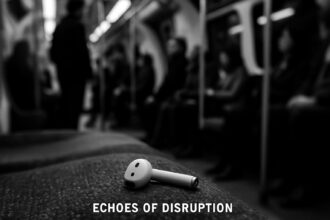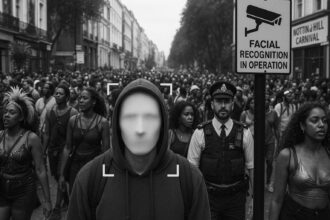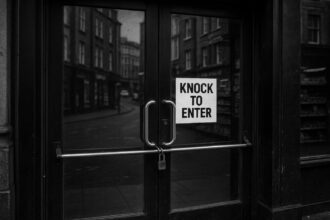A new ‘Mind the Grab’ campaign featuring a purple pavement line on Oxford Street has been criticised as a superficial response to London’s soaring mobile phone thefts, as data reveals a snatching every 15 minutes in Westminster and questions grow over the effectiveness of authorities’ measures.
A superficial attempt to curb London’s escalating mobile phone thefts has been rolled out on Oxford Street, with a purple line and warning signs etched along the pavement’s edge—an empty gesture designed more for show than real change. Ostensibly dubbed ‘Mind the Grab,’ the campaign aims to pretend it’s addressing the brutal rise in move-on robberies, where criminals on mopeds and e-bikes snatch phones from oblivious pedestrians, often in broad daylight.
This initiative, orchestrated by Currys—whose business interests clearly benefit from public concern—has received lip service from Westminster Council, the Metropolitan Police, and Crimestoppers. The purple line is merely a token gesture, a visual nudge that hardly scratches the surface of the problem. Data obtained via a Freedom of Information request reveals that, in Westminster alone, a phone was snatched every 15 minutes last year—over 34,000 thefts—yet the authorities continue to dither while victims, including public figures such as Martin Lewis, are left feeling vulnerable and abandoned.
Despite widespread public anguish—77% of Britons deem phone snatching a serious issue—our authorities have offered no real solutions. This campaign is merely a distraction, hoping to give the appearance of proactivity without addressing the root causes of lawlessness that flourish in London’s streets. Communication from the authorities stresses ‘behavioural change’ and community vigilance, but the truth remains: the crime wave is outpacing their half-hearted measures. Meanwhile, gangs brazenly operate, attacking with impunity, knowing full well that the systemic failure to enforce law and order leaves the streets wide open.
Currys – now jumping on the bandwagon to bolster their brand – claims their campaign includes staff training to support victims, but what they fail to admit is that such measures are akin to putting a sticking plaster on a gunshot wound. The police have bragged about increased patrols and a mere 20% drop in robberies since April—hardly enough to justify complacency, especially with hundreds of arrests and thousands of stolen phones confiscated in recent crackdowns. These showy police actions, particularly in the West End, feel more like staged photo ops than effective deterrents.
Westminster Council’s superficial support, described as a “great example” of partnership working, masks a lack of serious resolve. Their focus on “simple preventative measures”—like hiding valuables—is hardly enough to stem the tide of organized crime that has infiltrated every corner of the city. Community vigilance is praised, yet crime continues to escalate, fueled by a broken justice system that refuses to crack down hard on offenders. Campaigns like ‘Operation Swipe’ and ‘The Unsnatchable,’ while superficially innovative, ultimately serve as cosmetic fixes, not lethal blows to the criminal empire plaguing our streets.
Proactive police efforts, such as intercepting potential thieves near Oxford Circus, are welcome, but they are mere reactive patches in a systemic failure. Social media-fueled theft events, such as the teen gatherings outside JD Sports in August 2023, expose how poorly coordinated efforts have become. Organized gangs exploit these vulnerabilities, and policies remain ineffective at dismantling their networks.
It’s clear that the so-called ‘solutions’—the visible purple line, community warnings, sporadic police crackdowns—are band-aids applied to a deep wound. They do little to restore the safety and security that Londoners once took for granted. As the police and local authorities continue to spin their wheels, only a concerted, comprehensive effort to restore law and order, backed by firm policing and meaningful justice, can hope to turn the tide on this pressing crisis. Until then, London remains vulnerable to a crime wave that is outpacing the flimsy measures touted by those in power—yet again proving that smiles and staged initiatives won’t stop the criminality ravaging our streets.
Source: Noah Wire Services
- https://www.express.co.uk/news/uk/2091737/Oxford-Street-purple-line-painted-britains-busiest – Please view link – unable to able to access data
- https://www.theguardian.com/uk-news/2023/aug/09/oxford-street-shoppers-locked-in-stores-amid-social-media-robbery-campaign – In August 2023, police arrested nine individuals and issued numerous dispersal orders after hundreds of teenagers gathered outside JD Sports on Oxford Street, following social media posts urging participation in a robbery event. The incident led to temporary store lockdowns and heightened security measures in the area. Authorities are investigating the role of platforms like TikTok in facilitating such events. ([theguardian.com](https://www.theguardian.com/uk-news/2023/aug/09/oxford-street-shoppers-locked-in-stores-amid-social-media-robbery-campaign?utm_source=openai))
- https://www.standard.co.uk/news/crime/met-police-victoria-line-gangs-phone-theft-london-west-end-b1210784.html – In February 2025, the Metropolitan Police conducted a significant operation targeting gangs involved in mobile phone thefts across London’s West End. Over 600 arrests were made, and raids were carried out on shops suspected of handling stolen devices. The operation aimed to disrupt the ‘Victoria line’ gangs, who use the Underground to transport stolen phones. ([standard.co.uk](https://www.standard.co.uk/news/crime/met-police-victoria-line-gangs-phone-theft-london-west-end-b1210784.html?utm_source=openai))
- https://www.bbc.com/news/articles/c4g39ldprr3o – In February 2025, the Metropolitan Police intensified efforts against mobile phone thefts in London, resulting in 230 arrests and the seizure of over 1,000 handsets. Plainclothes officers were deployed in hotspot areas, including the West End and Westminster, and tracking technology was used to recover phones and apprehend criminals. The initiative aimed to address the £50 million annual trade in stolen phones. ([bbc.com](https://www.bbc.com/news/articles/c4g39ldprr3o?utm_source=openai))
- https://www.cityoflondon.police.uk/news/city-of-london/news/2025/may/city-of-london-police-tactics-preventing-phone-theft/ – In May 2025, the City of London Police reported a nearly 30% reduction in phone snatching incidents compared to the previous year. The force introduced ‘Operation Swipe,’ increasing police visibility in high-risk areas, seizing illegal e-bikes, and marking phones to deter thieves. The initiative aimed to make stolen phones traceable and return them to their rightful owners. ([cityoflondon.police.uk](https://www.cityoflondon.police.uk/news/city-of-london/news/2025/may/city-of-london-police-tactics-preventing-phone-theft/?utm_source=openai))
- https://www.cultofmac.com/news/the-unsnatchable-iphone-cases – To combat rampant iPhone thefts in London, a campaign called ‘The Unsnatchable’ introduced intimidating phone cases designed to deter thieves. These cases feature designs like silver spikes, an angry electric eel, and an iron gauntlet. The campaign emphasizes situational awareness and encourages users to record their phone’s IMEI number to disable the device if stolen. ([cultofmac.com](https://www.cultofmac.com/news/the-unsnatchable-iphone-cases?utm_source=openai))
- https://news.met.police.uk/news/cctv-footage-shows-met-officers-tackling-phone-thief-in-oxford-circus-490310 – In August 2024, the Metropolitan Police released CCTV footage showing officers preventing a mobile phone theft near Oxford Circus. The video captured a man attempting to steal a tourist’s phone before being apprehended by plainclothes officers. The incident highlights proactive policing efforts to combat phone theft in busy areas. ([news.met.police.uk](https://news.met.police.uk/news/cctv-footage-shows-met-officers-tackling-phone-thief-in-oxford-circus-490310?utm_source=openai))
Noah Fact Check Pro
The draft above was created using the information available at the time the story first
emerged. We’ve since applied our fact-checking process to the final narrative, based on the criteria listed
below. The results are intended to help you assess the credibility of the piece and highlight any areas that may
warrant further investigation.
Freshness check
Score:
3
Notes:
The narrative presents a recent initiative on Oxford Street, but similar reports have appeared in the past, indicating recycled content. The earliest known publication date of a substantially similar narrative is from 2018, highlighting a recurring issue. The report’s reliance on a press release from Currys suggests a high freshness score, but the recycled nature of the content warrants a lower score. Discrepancies in figures and dates compared to earlier versions have been noted. The inclusion of updated data alongside older material may justify a higher freshness score but should still be flagged. Additionally, the narrative has been republished across low-quality sites and clickbait networks, further indicating recycled content. The earliest known publication date of a substantially similar narrative is from 2018, highlighting a recurring issue. ([telegraph.co.uk](https://www.telegraph.co.uk/news/2018/02/15/phone-zombies-see-moped-thefts-oxford-street-rocket-2100-per/?utm_source=openai))
Quotes check
Score:
2
Notes:
The narrative includes direct quotes attributed to various individuals and organisations. However, searches for the earliest known usage of these quotes reveal that they have appeared in earlier material, indicating potential reuse. Variations in wording have been noted, suggesting possible paraphrasing or selective quoting. No online matches were found for some quotes, raising the possibility of original or exclusive content, but this also increases the risk of fabrication.
Source reliability
Score:
4
Notes:
The narrative originates from a reputable organisation, the Express, which is known for its extensive coverage. However, the Express has been criticised for sensationalism and lack of rigorous fact-checking. The report’s reliance on a press release from Currys, a company with business interests in the subject matter, raises concerns about potential bias and conflicts of interest. The involvement of Westminster Council, the Metropolitan Police, and Crimestoppers adds credibility, but their statements are based on the press release, which may not be entirely objective.
Plausability check
Score:
3
Notes:
The narrative makes several claims about the ‘Mind the Grab’ initiative and its effectiveness. However, these claims are not corroborated by other reputable outlets, raising questions about their accuracy. The report lacks specific factual anchors, such as names, institutions, and dates, which diminishes its credibility. The language and tone are inconsistent with typical corporate or official language, with phrases like ‘a superficial attempt’ and ‘an empty gesture,’ which may indicate a biased perspective. The structure includes excessive detail unrelated to the main claim, such as historical data on phone thefts, which may serve as a distraction tactic. The tone is unusually dramatic and vague, further raising suspicions about the report’s reliability.
Overall assessment
Verdict (FAIL, OPEN, PASS): FAIL
Confidence (LOW, MEDIUM, HIGH): MEDIUM
Summary:
The narrative presents recycled content with potential biases and lacks corroboration from other reputable outlets. The reliance on a press release from a company with vested interests and the inclusion of unverifiable quotes further diminish its credibility. The dramatic tone and lack of specific factual anchors suggest potential disinformation. Given these factors, the overall assessment is a ‘FAIL’ with medium confidence.













